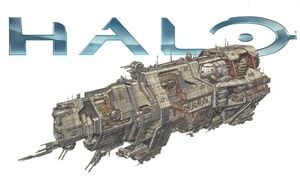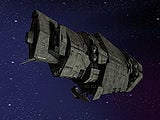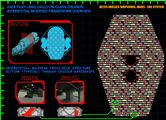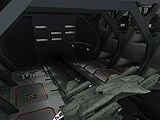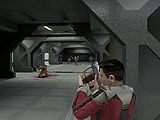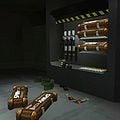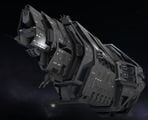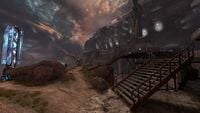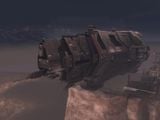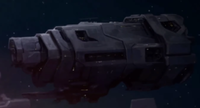Halcyon-class light cruiser
From Halopedia, the Halo wiki
| Halcyon-class light cruiser | |||||||||||||||||||||||
|---|---|---|---|---|---|---|---|---|---|---|---|---|---|---|---|---|---|---|---|---|---|---|---|
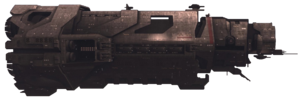
| |||||||||||||||||||||||
| Class attributes | |||||||||||||||||||||||
|
Identification: |
|||||||||||||||||||||||
|
Operators: |
|||||||||||||||||||||||
|
Manufacturer: |
|||||||||||||||||||||||
|
Naval architect: |
|||||||||||||||||||||||
|
Built: |
50[1] | ||||||||||||||||||||||
|
In service: |
2510[2] - present | ||||||||||||||||||||||
| |||||||||||||||||||||||
- "A dozen Covenant superior battleships against a single Halcyon-class cruiser. Given those odds, I'm content with three...make that four kills."
- — Cortana during the Battle of Installation 04.[6]
The Halcyon-class light cruiser,[2] known as the Human Attack Ship class C-II by the Covenant,[7] is a United Nations Space Command cruiser starship classification designed by Dr. Robert McLees before 2507, with a hull classification symbol of C. Originally designed for attack and defense role in mind,[8] they were also capable of being used as troop and supply transports.[3]
Their service lives were short due to a unique hull design that was costly to construct and maintain with low maneuverability, poor armament, and concerns about their tactical viability. They were replaced by the Marathon-class cruiser and later the Autumn-class heavy cruiser. Despite the disadvantages of the original design, the heavily modified UNSC Pillar of Autumn proved to be one of the most effective, and costly, ships deployed in the war.
Overview
Design details
Maintaining the monolithic hull design of other UNSC cruisers, the Halcyon-class were visually distinguished by their composition of five hexagonal and octagonal hull sections, each of which stacked on top of each other and progressively grew as they ran towards the engines. The frontmost surface of these cruisers was dominated by a long antenna structure called the foremast, whose base sat below the muzzle of the MAC. The bridge was slung underneath the front section on a portruding structure, which made it very vulnerable to enemy fire. The second-last hull section possessed four docking bays that ran down either side like an equatorial line, and the keel featured a drop bay capable of deploying both SOEIV and dropships. Personnel made use of lifts, stairs, and mag-rail platforms for quick transit around the cruiser.[9] To evacuate personnel during emergencies, these cruisers had at least 18 Class-3 Bumblebees.
The aftmost section was largely devoted to the cruiser's propulsion and powerplant systems, which as originally installed were three Mark II Hanley-Messer DFRs.[5] Designed for bulk manoeuvring rather than speed,[10] they were woefully obsolete by 2552, only capable of providing a tenth the output of more modern systems.[11] They were complemented by four compact auxiliary fusion rockets mounted in pairs, which could provide high thrust but were dogged by inefficiency.[9] Combined, they gave the Halcyon-class a profound lack of speed, and coupled with their minimal firepower they were ineffective in combat.[11]
The most curious element of the Halcyon-class was their unusual frame construction. Designed by Doctor Robert McLees, they made use of a series of internal cross bracings and Titanium-A[12] honeycombs. This feature gave the class a reputation for enduring serious punishment, despite their usage of older, heavier armor that provided less protection than modern standards. Halcyon-class cruisers were known to remain operational despite suffering breaches to all compartments and losing 90% of their armor. However, such a scheme was costly and grossly overmassed compared to more conventional measures, which led to it being dropped after the first eleven cruisers.[11] Aiding in this, corridors aboard the Halcyon-class possessed retractable containment bulkheads which could seal off breached or overrun sections of the ship.[13] During emergencies, the environmental systems could vent each section to asphyxiate the occupants within.[14] The ship was pocketed with numerous maintenance and service corridors that ran the length of the ship. If necessary, these expansive corridors, including a Class Seven service corridor running along the dorsal structure of the vessel, could permit passage to Warthogs and some sections were large enough to accept Pelicans.[13]
There were two distinct visual varieties of Halcyon-class cruisers: the earliest version of the cruiser had a rather smooth and flat construction,[6] while later portrayals incorporated cut-out portions and often featured Mark 33 Spitfire naval coilgun battery.
Halcyon-class cruisers were constructed in space and are not rated for atmospheric deployment.[14] If necessary, detachable R7 thrust couplings could provide them with limited atmospheric flight.[15]
Armament
The Halcyon-class was by far the most lightly-armed of the UNSC's cruiser classes, being armed with only one Magnetic Accelerator Cannon, 180 Archer missiles, and four Shiva-class nuclear missiles.[3]
An alternative armament scheme provided the Halcyon-class with a single Mark II 56A2D4 light MAC as its primary weapon. This was bolstered with twenty M58 Archer missile pods, which was far below standards at the time. The class' firepower was further supplemented with four Mark 33 Spitfire naval coilgun batteries and four M66 Sentry autocannons, with both types of turrets featuring two barrels each. The Halcyon-class cruisers could also be equipped with forty point defense guns, using either the M810 Helix or the M910 Rampart point defense guns.[2]
Refits
- Main article: UNSC Pillar of Autumn § Design details
Although considered subpar ships, the pressure of the Human-Covenant War forced the UNSC to recommission and refit Halcyon-class cruisers back into service. Generally, they received token armament upgrades through the installation of a MAC and an additional six Archer missile pods.[11] However, when called upon substantially greater changes were authorised.
By far the most expansive and famous of these were the alterations the UNSC Pillar of Autumn received as part of preparations for Operation: RED FLAG. Selected due to its possession of the honeycomb framing scheme, the refit took advantage of the need to replace its hull plating with reformulated Titanium-A armor, which reduced its mass but also freed up internal volume. Much of this would be taken up by hangars and SOEIV launch bays, although the former required the removal of long-term accommodations.[2] Power was improved with an experimental reactor setup that could not only increase output by up to 300% for short periods of time, but made use of a very efficient laser-induced ion cooling system. Armament was finally expanded, with a MAC capable of firing three times on the same charge,[12] 32 M58 Archer missile pods, 8 Mark 33 Spitfire naval coilgun batteries, and six M66 Sentry autocannons. 18 M910 Rampart point defense guns with overlapping fields of fire provided the final layer of protection against missiles and incoming munitions.[9]
Service history
At just over 1.17 kilometers in length, the Halcyons were the lightest of vessels to be designated and structured as cruisers.[11] Considered subpar compared to later ships, these cruisers only served for a handful of years before they were placed into long-term storage near Europa,[2] and were eventually designated for scrapping.[11] Some of these were disposed even into 2552, as the Asźod ship breaking yards were in the process of scrapping at least one Halcyon-class cruiser by that time.[15]
When the Human-Covenant War erupted in 2525 a number of Halcyon cruisers were reactivated from storage and refitted. Some participated in remarkably early engagements of the war; Vice Admiral Cole's Battle Group X-Ray fought the Battle of Harvest with a number of these cruisers.[16] Even this early on, it was evident that the Halcyons were not invulnerable; UNSC Constantinople was lost with all hands during this battle. Meanwhile, the UNSC Pillar of Autumn took heavy damage when it teamed up with three other ships to destroy a Ket-pattern battlecruiser during the Battle for Arcadia.[17] This led to a substandard performance record for the cruisers, and they'd come to be known as a joke within the UNSC Navy.[11]
Halcyon-class cruisers continued to serve throughout the conflict. As the losses continued to mount, the UNSC were forced to consider radical improvements to keep the ships competitive. The UNSC Pillar of Autumn received one such overhaul as part of the planned Operation: RED FLAG, and used it to great effect during the subsequent Fall of Reach, where it was instrumental to the destruction of a Kewu-pattern battleship.[18] Later, during the approach to Alpha Halo, it managed to destroy four Covenant capital ships before being forced to crash onto the ring's surface, a phenomenal performance for a UNSC cruiser.[19] Ultimately, the Autumn met its end when its engines were overloaded to destroy the Halo and much of the Covenant's Fleet of Particular Justice,[20] leaving behind only a handful of survivors.
The first of the Autumn-class heavy cruisers, commissioned into service following the end of the Human-Covenant War,[21] would be built from the recycled hulls of surviving Halcyon-class vessels.[22]
Ships of the line
Out of 50 Halcyon-class light cruisers built, the first 11 have the honeycomb superstructure while the other 39 have an unspecified construction.[1]
Honeycomb superstructure
This is the list of Halcyon-class light cruisers with the honeycomb superstructure:
- UNSC Halcyon - The lead ship of the class.
- UNSC Pillar of Autumn (C-709) - Participated in the Battle for Arcadia in 2531, destroying a Covenant battlecruiser alongside three other human ships and providing ground support for the UNSC Spirit of Fire. After refitting in 2552, the Autumn, captained by Jacob Keyes, was selected as the SPARTAN-IIs' chariot for Operation: RED FLAG, due to its new resilience and firepower. Destroyed by John-117 in the Battle of Installation 04 through wildcat destabilization of the engines, as a means to destroy Halo Installation 04.
Unknown superstructure
This is a list of Halcyon-class light cruisers that haven't gotten their superstructure confirmed yet:
- UNSC Constantinople - Participated and destroyed during the Second Battle of Harvest in 2526.
- UNSC Dawn Under Heaven
- UNSC Persian Gate - Participated in the Battle of Alpha Corvi II in 2526.
- UNSC Roman Blue - The first ship to be captained by Terrence Hood; participated in the Battle for Arcadia.[23] Shot down in battle between 2535 and 2552 and crashed on Eiro. Wreckage later salvaged by the Ace of Spades before an unknown vessel, possibly belonging to ONI, glassed Roman Blue's remains.[24]
- UNSC Toulouse - Participated in an engagement over an unidentified Forerunner installation with a Covenant fleet.
Trivia

|
Browse more images in this article's gallery page. |
- "Halcyon" is derived from the Greek word "Alcyone", which means "marked by peace and prosperity".
- The scrapped hulls of several Halcyon-class cruisers can be seen in the Halo: Reach campaign level The Pillar of Autumn and the multiplayer map Boneyard.
- The Pillar of Autumn's model from Halo: Reach is considerably larger than its original Halo: Combat Evolved counterpart. Indeed, it is longer than even the Marathon-class cruiser.
- The Pillar of Autumn plays a role in Halo: Combat Evolved, Halo: Reach and Halo Wars. In each game, the ship provides support to the player in some form.
Gallery
An armory
A Halcyon-class using its 50mm PDG against Covenant boarding craft in Halo Legends: Origins.
Halcyon cruisers sitting in a decommissioning yard on Reach.
Another view of a Halcyon class cruiser on Reach.
Halcyon-class cruisers during an unknown battle in Halo: Escalation.
A Halcyon-class light cruiser in Halo 2: Anniversary terminals.
The UNSC Toulouse, on an early draft of the Halo: Warfleet cover.
List of appearances
|
|
Sources
- ^ a b c Halo: Combat Evolved: Sybex Official Strategies & Secrets, page 60
- ^ a b c d e f g h i j k l m n Halo Encyclopedia (2022 edition), page 119
- ^ a b c d e f g h Halo Encyclopedia (2011 edition), page 261
- ^ a b c Halo: Combat Evolved 3D model data
- ^ a b c d Data drops: Data drop 5
- ^ a b Halo: Combat Evolved, campaign level The Pillar of Autumn
- ^ Halo: The Flood, Prologue
- ^ Halo: The Essential Visual Guide, page 42
- ^ a b c Halo: Warfleet, page 24-25
- ^ Halo Mythos, page 94
- ^ a b c d e f g Halo: The Fall of Reach, Chapter 25
- ^ a b Halo: The Fall of Reach, chapter 29
- ^ a b Halo: Combat Evolved, campaign level The Maw
- ^ a b Halo: The Flood, chapter 1
- ^ a b Halo: Reach, campaign level The Pillar of Autumn
- ^ Halo Wars: Genesis
- ^ Halo Wars, campaign level Arcadia City
- ^ Halo: The Fall of Reach, chapter 36
- ^ Halo: Combat Evolved, campaign level Pillar of Autumn
- ^ Halo: Combat Evolved, campaign level The Maw
- ^ Halo 4: The Essential Visual Guide
- ^ Halo: Warfleet, chapter Human, Cruisers
- ^ Halo: Escalation, Issue #5
- ^ Halo: Smoke and Shadow
- ^ Halo Waypoint: Canon Fodder - Taking Orders
| ||||||||||||||||||||||||||||||||||||||||||||||||||||||||
